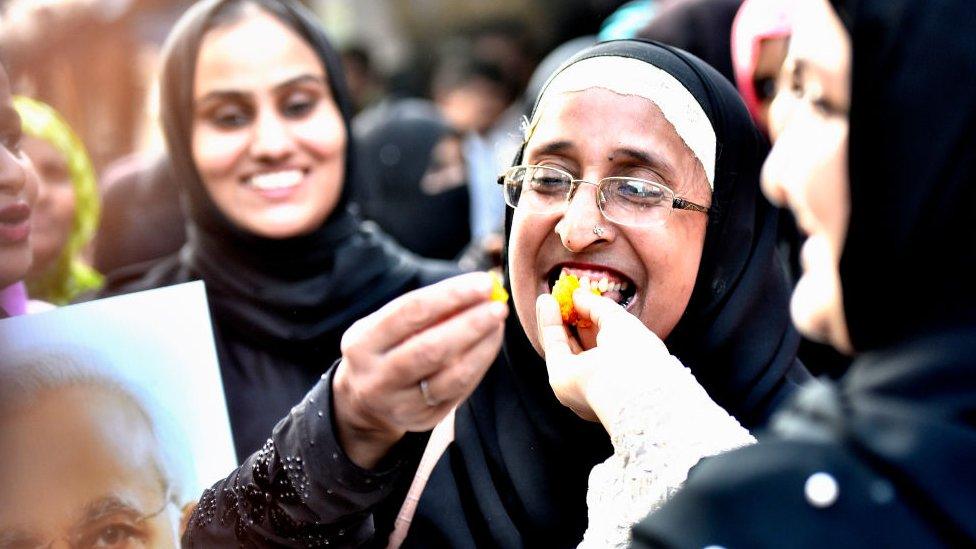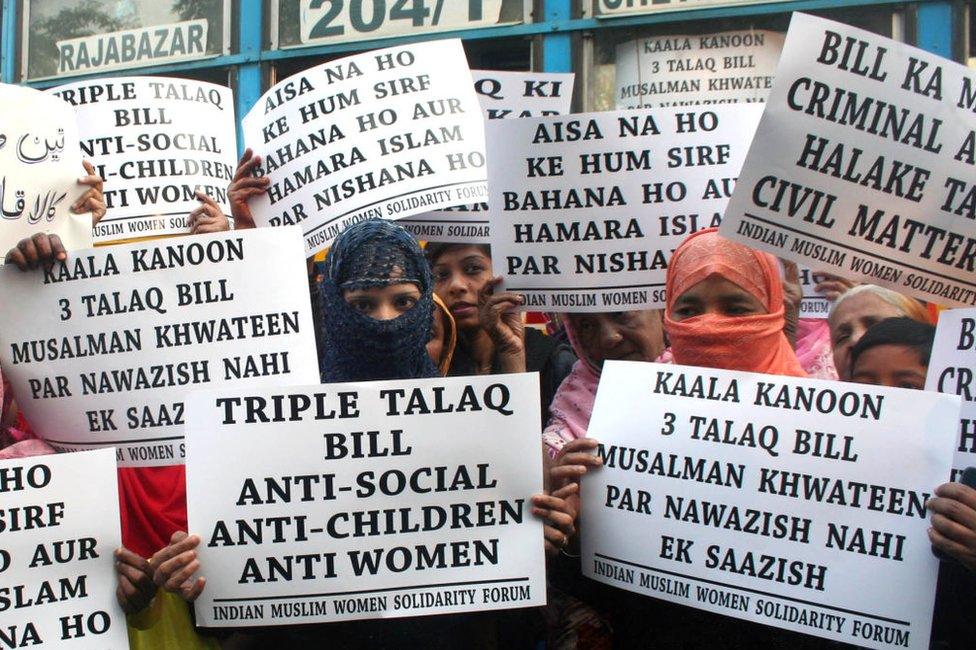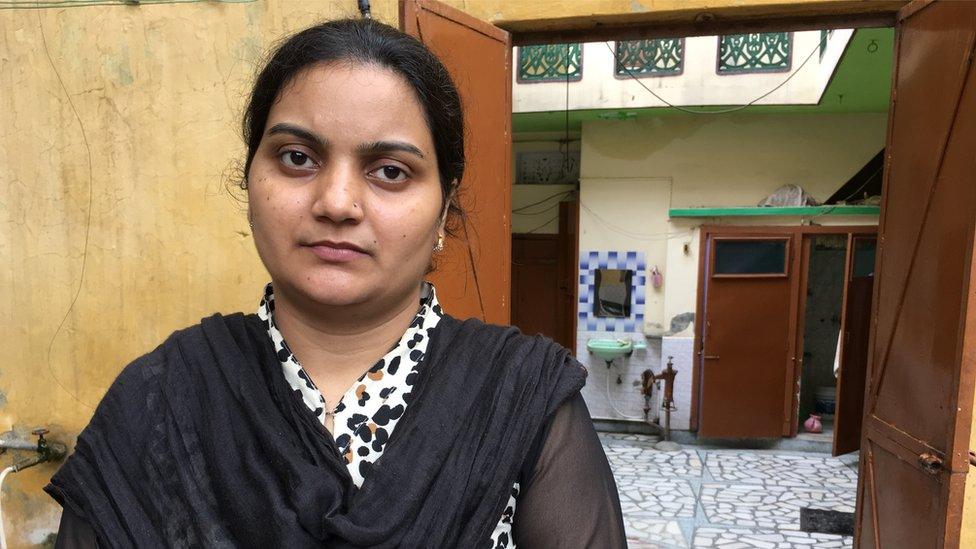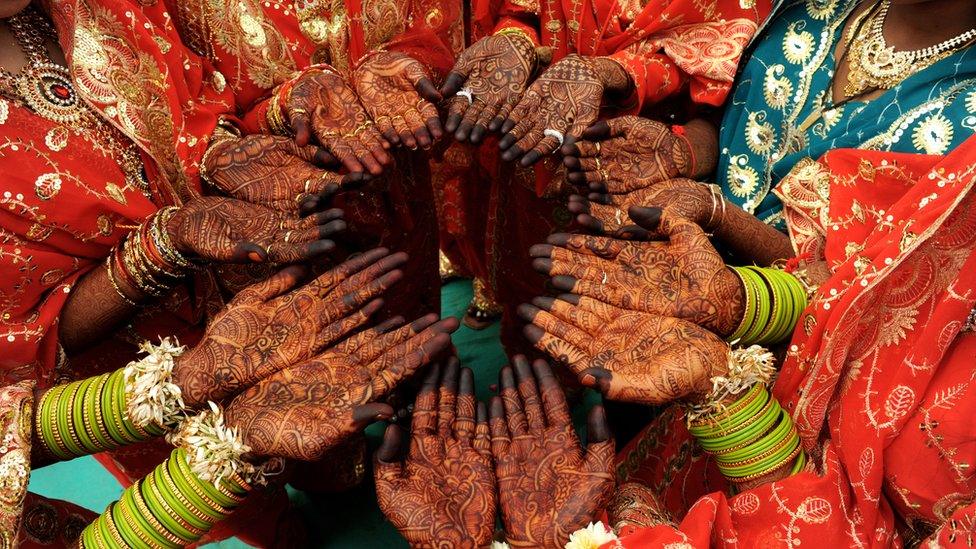Triple talaq: India criminalises Muslim 'instant divorce'
- Published

Some women welcomed the bill
India's parliament has approved a bill that makes the Muslim practice of "instant divorce" a criminal offence.
"Triple talaq", as it's known, allows a husband to divorce his wife by repeating the word "talaq" (divorce) three times in any form, including email or text message.
The Supreme Court declared the practice unconstitutional in 2017.
Supporters say the new measure protects Muslim women. Opponents say the punishment is harsh and open to misuse.
Men found in breach of the new law can be jailed for up to three years.
The bill was first tabled in 2017 but stalled in the upper house of parliament, where some MPs called it unfair.
India's governing Bharatiya Janata Party (BJP) supports the bill, while the main opposition Congress party opposes it.
Triple talaq: Why I fought instant divorce
But the BJP doesn't have a majority in the upper house. On Tuesday, the bill was passed by 99 votes to 84 after a number of walkouts and abstentions.
Prime Minister Narendra Modi was quick to celebrate the vote as "a victory of gender justice".
Allow X content?
This article contains content provided by X. We ask for your permission before anything is loaded, as they may be using cookies and other technologies. You may want to read X’s cookie policy, external and privacy policy, external before accepting. To view this content choose ‘accept and continue’.
But others accused his Hindu nationalist BJP of targeting Muslims.
Asaduddin Owaisi, an MP from the opposition All India Majlis-e-Ittehadul Muslimeen party, said the new law was another attack on Muslim identity under the BJP, which has been in power since 2014.
Allow X content?
This article contains content provided by X. We ask for your permission before anything is loaded, as they may be using cookies and other technologies. You may want to read X’s cookie policy, external and privacy policy, external before accepting. To view this content choose ‘accept and continue’.
What is instant divorce?
There have been cases in which Muslim men in India have divorced their wives by issuing the so-called triple talaq by letter, telephone and, increasingly, by text message, WhatsApp and Skype. A number of these cases made their way to the courts as women contested the custom.
Triple talaq divorce has no mention in Sharia Islamic law or the Koran, even though the practice has existed for decades.

Shayara Bano petitioned the Supreme Court to declare triple talaq unconstitutional
Islamic scholars say the Koran clearly spells out how to issue a divorce - it has to be spread over three months, allowing a couple time for reflection and reconciliation.
Most Islamic countries, including Egypt, the United Arab Emirates, Pakistan and Bangladesh, have banned triple talaq, but the custom continued in India, which does not have a uniform set of laws on marriage and divorce that apply to every citizen.
Why is the bill so controversial?
Campaigners and political parties are sharply divided over the bill. Those against it, including some Muslim women, point out that it's unusual to criminalise divorce.
The Congress party and others have pointed out the practice was already outlawed by the country's top court. Others have said the state has no place in regulating the marital home.

Some Muslim women have opposed the bill
But those in favour of the bill say triple talaq is deeply discriminatory towards women.
Law Minister Ravi Shankar Prasad defended the bill, saying the practice had not stopped despite it being banned. He told the Rajya Sabha that some 574 cases were reported after the Supreme Court verdict.
"The judgement has come, but no action on triple talaq has been taken. That is why we have brought this law, because the law is a deterrence," he said.
Campaigners say it's almost impossible to quantify how many cases of triple talaq occur in India.
- Published22 August 2017

- Published22 August 2017

- Published22 August 2017

- Published11 April 2016
